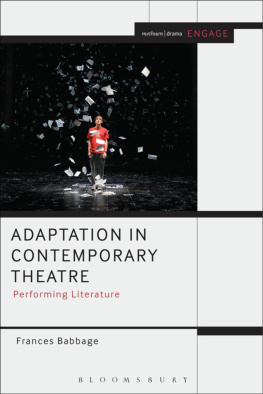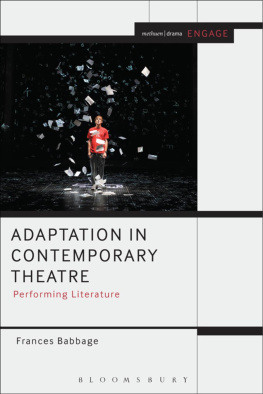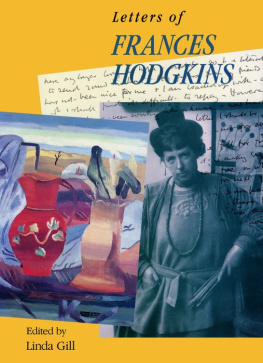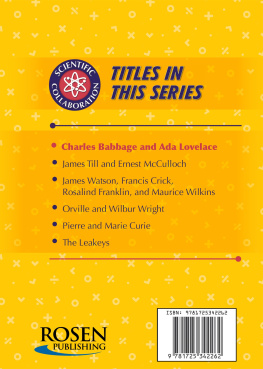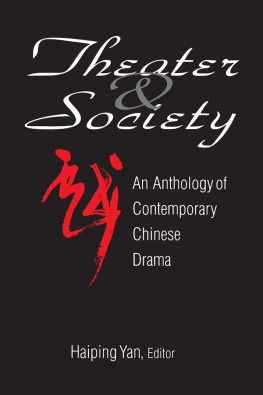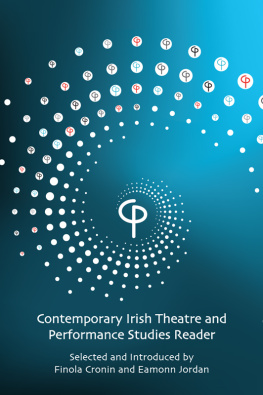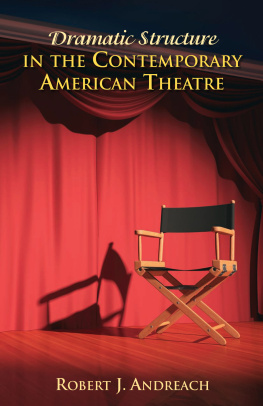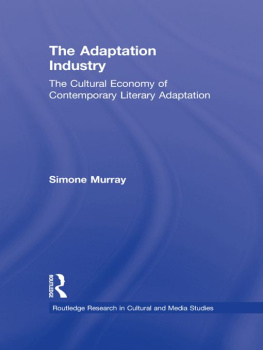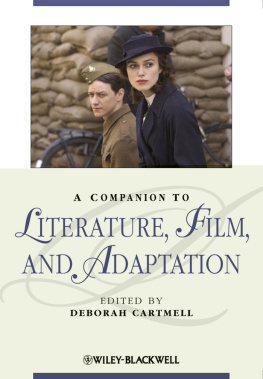Frances Babbage - Adaptation in Contemporary Theatre
Here you can read online Frances Babbage - Adaptation in Contemporary Theatre full text of the book (entire story) in english for free. Download pdf and epub, get meaning, cover and reviews about this ebook. year: 2019, publisher: Bloomsbury UK, genre: Romance novel. Description of the work, (preface) as well as reviews are available. Best literature library LitArk.com created for fans of good reading and offers a wide selection of genres:
Romance novel
Science fiction
Adventure
Detective
Science
History
Home and family
Prose
Art
Politics
Computer
Non-fiction
Religion
Business
Children
Humor
Choose a favorite category and find really read worthwhile books. Enjoy immersion in the world of imagination, feel the emotions of the characters or learn something new for yourself, make an fascinating discovery.
- Book:Adaptation in Contemporary Theatre
- Author:
- Publisher:Bloomsbury UK
- Genre:
- Year:2019
- Rating:4 / 5
- Favourites:Add to favourites
- Your mark:
- 80
- 1
- 2
- 3
- 4
- 5
Adaptation in Contemporary Theatre: summary, description and annotation
We offer to read an annotation, description, summary or preface (depends on what the author of the book "Adaptation in Contemporary Theatre" wrote himself). If you haven't found the necessary information about the book — write in the comments, we will try to find it.
Adaptation in Contemporary Theatre — read online for free the complete book (whole text) full work
Below is the text of the book, divided by pages. System saving the place of the last page read, allows you to conveniently read the book "Adaptation in Contemporary Theatre" online for free, without having to search again every time where you left off. Put a bookmark, and you can go to the page where you finished reading at any time.
Font size:
Interval:
Bookmark:
Adaptation in Contemporary Theatre
Methuen Drama Engage offers original reflections about key practitioners, movements and genres in the fields of modern theatre and performance. Each volume in the series seeks to challenge mainstream critical thought through original and interdisciplinary perspectives on the body of work under examination. By questioning existing critical paradigms, it is hoped that each volume will open up fresh approaches and suggest avenues for further exploration.
Series Editors
Mark Taylor-Batty
Senior Lecturer in Theatre Studies, Workshop Theatre, University of Leeds, UK
Enoch Brater
Kenneth T. Rowe Collegiate Professor of Dramatic Literature & Professor of English and Theater, University of Michigan, USA
Titles
Authenticity in Contemporary Theatre and Performance
by Daniel Schulze
ISBN 9781350000964
Beat Drama: Playwrights and Performances of the Howl Generation
edited by Deborah R. Geis
ISBN 9781472567871
The Contemporary American Monologue: Performance and Politics
by Eddie Paterson
ISBN 9781472585011
Drama and Digital Arts Cultures
by David Cameron, Michael Anderson and Rebecca Wotzko
ISBN 9781472592194
Social and Political Theatre in 21st-Century Britain: Staging Crisis
by Vicky Angelaki
ISBN 9781474213165
Theatre in the Dark
edited by Adam Alston and Martin Welton
ISBN 9781474251181
Watching War on the Twenty-First Century Stage: Spectacles of Conflict
by Clare Finburgh
ISBN 9781472598660
Adaptation in Contemporary Theatre
Performing Literature
Frances Babbage
Series Editors
Enoch Brater and Mark Taylor-Batty
Bloomsbury Methuen Drama
An imprint of Bloomsbury Publishing Plc

For Marcus and Sam, with love
Many people have provided help and guidance in the process of this books composition. I am especially grateful to the writers, artists and theatre-makers who generously shared their time and resources: Peter Bailey, Tim Etchells, Ant Hampton, Peter Jaeger, Keith Lodwick, Teresa Ludovico, Alberto Prandini, Felix Mortimer, Ans Van den Eede, Wannes Gyselinck and James Yarker. Many thanks to the academic colleagues who have read work in progress, given advice, kept me company at the theatre, or otherwise supported the research: Anna Barton, Joe Bray, Bridget Escolme, Sam Ladkin, Carmen Levick, David McCallum, Bill McDonnell, Marcus Nevitt, Patrice Pavis, Steve Nicholson, Amber Regis, Terry OConnor, Adam Piette, Sue Vice, Tomasz Wisniewski, Angela Wright and Rachel Zerihan. A period of research leave granted by the University of Sheffield was also of invaluable help. I am very grateful to Mark Taylor-Batty and Enoch Brater for editorial support, likewise to Mark Dudgeon and Susan Furber at Bloomsbury Methuen Drama. Finally, I would like to thank my family and, above all, Marcus and Sam, for their encouragement, love and a fair amount of patience.
Notes
Part of was previously published as: How Books Matter: Theatre, Adaptation and the Life of Texts. Tomasz Wisniewski, ed., Between Page and Stage: Between.Pomidzy (Gdansk: The University of Gdask Press, forthcoming).
Part of .
This book is about theatre that is made from prose. The history of drama is also the history of prose transformation, and adaptation of this kind is as popular in the contemporary theatre as it has ever been. Today, the theatre reworks not only novels and short stories, but less likely sources such as biography and autobiography, poetry, letters, manifestos and reference works. Beyond theatre buildings, prose literature feeds live art, installations, and site-specific and immersive theatre, thus performance practices which do not automatically assume the existence of a text at all. Theatre is an art self-evidently bound up with adaptation in the widest sense, since repetition, re-presentation and revision are integral to its operations and expected by its audiences. Given the nature of contemporary theatrical production, which values bold and subtle treatments of established plays quite as much as new dramatic writing, and whose sophisticated audiences comfortably accommodate intertextual reference and multimediality, it is not surprising that, in critical terms, the performance of prose literatures today has largely been subsumed within that larger culture of re-presentation rather than singled out for special scrutiny. However, this book seeks to demonstrate that although different forms of intertextuality will necessarily overlap, and no type of adaptation is more important or worthy of attention than another, the consequence of a pluralist perspective has been that too little consideration has been given thus far to what might be uniquely significant in prose adaptation within the theatrical context.
While reinterpretation of dramatic texts is accepted as an essential marker of theatres vigour and continuing relevance, prose adaptation has always had a much more ambivalent reception. Dramatization of prose fiction, in the theatre and much more so on film, has been perceived as parasitic, as dully derivative, as hubristically ambitious, as opportunistic and money-driven, and as evidence of, and contributor to, the arts stagnation. The performance of prose has been prejudicially received even before the specifics of an adaptation project are considered: at which point the work itself may be criticized as reductive, superficial or a travesty; as lacking in depth, lacking complexity or simply lacking. Such bias still regularly surfaces in popular criticism and continues to be wrestled with in studies of adaptation on screen. Contemporary theatre scholarship does not typically regard prose adaptation as automatically contentious, yet in its analyses tends to slip such work amongst other kinds of intertextual and intermedial practice which can appear, by contrast, as somehow more innovative and vital. This book takes prose adaptation in the theatre as its particular focus in order to present this as practice that is not just artistically legitimate, distinctive and valuable, but one that has been, and continues to be, a lively force of creative regeneration. I argue that the contemporary theatres appetite for prose texts has engendered significant expansion of performance vocabularies: confronted by the problems posed by the dissimilar forms and conventions of non-dramatic literature, the theatre has been inspired compelled to extend its own formal boundaries, in the process confounding the expectations of its audience and newly illuminating the adapted material.
This study seeks to demonstrate how pervasively and variously prose literature is appropriated by contemporary performance. Thus, I consider adaptations inside the theatre and beyond it, in site-specific, promenade and immersive contexts, and in libraries and galleries; adaptations performed solo, in huge multi-company collaborations, and with no actor at all; adaptations which are technologically sophisticated, and others with little or no mediation of this kind; adaptations which are highly physical, and those which place puppets amongst the human cast; and adaptations in postdramatic theatre, including productions which emphasize and display adaptation failure. This book does not attempt to categorize adaptations, or rule that some textual relationships are adaptations and others not. Rather, the term adaptation as applied here embraces any performance project predicated upon, profoundly engaged with and concerned to represent prose literature: on occasion, even these generous definitional boundaries are stretched, I trust legitimately. My discussion of adaptation in contemporary theatre reveals that what is created by this process is only rarely a play, let alone one in which a literary source has been squeezed, kicking and screaming, into an alien dramatic mould; instead, the majority of adaptations considered here can be more accurately described as textual re-sitings, within which connections and disjunctions between the contents, forms and contexts of literature and performance are exposed. Prose adaptation emerges from this analysis as the very opposite of easy, parasitic or retrogressive; what becomes increasingly apparent is the difficulty of adaptation, the ingenuity and invention it demands, and the invigorated theatricalities it presents.
Next pageFont size:
Interval:
Bookmark:
Similar books «Adaptation in Contemporary Theatre»
Look at similar books to Adaptation in Contemporary Theatre. We have selected literature similar in name and meaning in the hope of providing readers with more options to find new, interesting, not yet read works.
Discussion, reviews of the book Adaptation in Contemporary Theatre and just readers' own opinions. Leave your comments, write what you think about the work, its meaning or the main characters. Specify what exactly you liked and what you didn't like, and why you think so.

